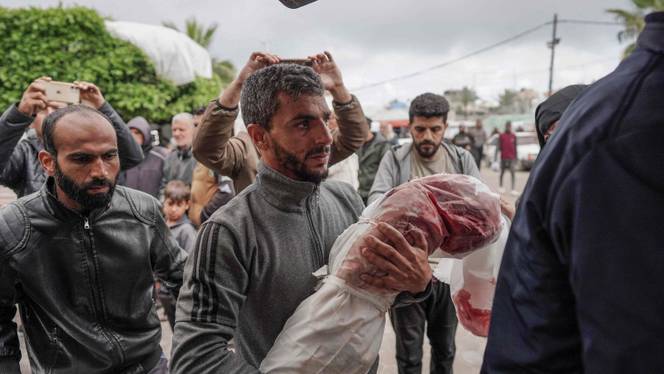Gaza, 10 April 2024, (GNP): Palestinians work to move the dead bodies as the Israeli army dismantles a temporary cemetery set up by Palestinians at Al-Shifa Hospital in Gaza City.
Palestinian nurse Maha Sweylem arrived at the devastated Al Shifa hospital in northern Gaza, hoping for news about her husband, a doctor there, while fearing the worst.
Teams from the World Health Organization came to assist in identifying the bodies scattered among the wreckage of Gaza’s largest hospital on Monday. The Israeli military reported engaging with militants at the hospital during intense fighting over the past two weeks, with the WHO confirming that patients were trapped inside.
Sweylem, speaking to AFP, revealed that she hadn’t seen her husband, Abdel Aziz Kali, since he was taken by the Israeli military during the assault. She remains uncertain about his fate. She recounted how the Israeli army swiftly encircled the hospital last month and then demanded through loudspeakers that “everyone must surrender. Game over.”
They then proceeded to fire at all the entrances, blocking any movement,” she recounted. “I stayed there for four days with my two young daughters, without food or drink. They cried out of hunger. When they arrested my husband, he hadn’t eaten for three days.”
AFP reached out to the Israeli army regarding Kali’s whereabouts, but there was no immediate response.
The Israeli military has often accused Hamas of using hospitals and medical facilities as hiding spots and command centers, with patients as shields.
Motasem Salah, the director of the Gaza Emergency Operations Centre, described the scenes at the vast medical center on Monday as “unbearable.” “The smell of death is pervasive,” he said, while a digger sifted through rubble and rescuers recovered decomposed bodies from the debris.
Salah mentioned Gaza’s lack of forensic experts and their reliance on the WHO and OCHA delegation for assistance in identifying the deceased. They are sorting through wallets and documents to identify decomposed bodies and crushed body parts.
Amjad Aliwa, head of Al Shifa’s emergency department, explained that relatives were present to determine the fate of their loved ones, whether they were killed, missing, or displaced to the south. He stressed the urgency of completing the task before bodies decompose, citing the lack of necessary equipment.
Several anxious relatives wandered among what the WHO described as “numerous shallow graves” outside the devastated emergency department and administrative and surgical buildings.
Read More: Pakistan agrees to launch PM Abiy’s green legacy initiative
According to the WHO’s statement after its initial visit to the site on Friday, “Many deceased individuals were partly buried, with their limbs visible.”
The WHO emphasized the importance of preserving dignity, even in death, as an essential humanitarian act.
Athanasios Gargavanis, the WHO surgeon leading the mission, lamented how a place once associated with saving lives now serves as a grim reminder of death. He asserted that hospitals should never be militarized.

